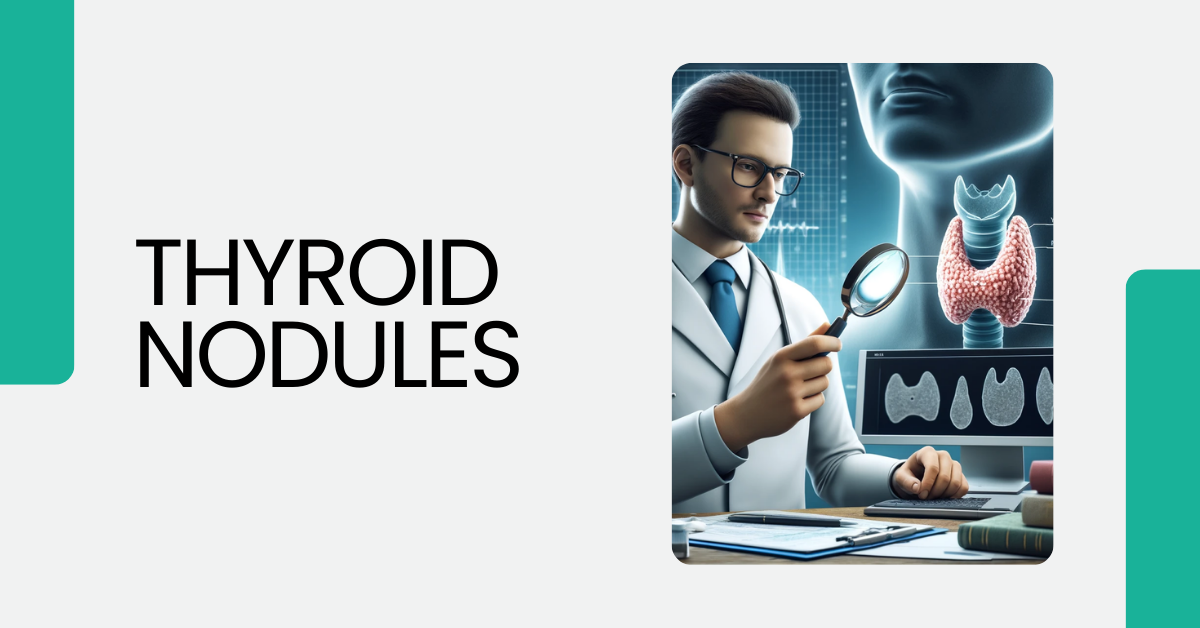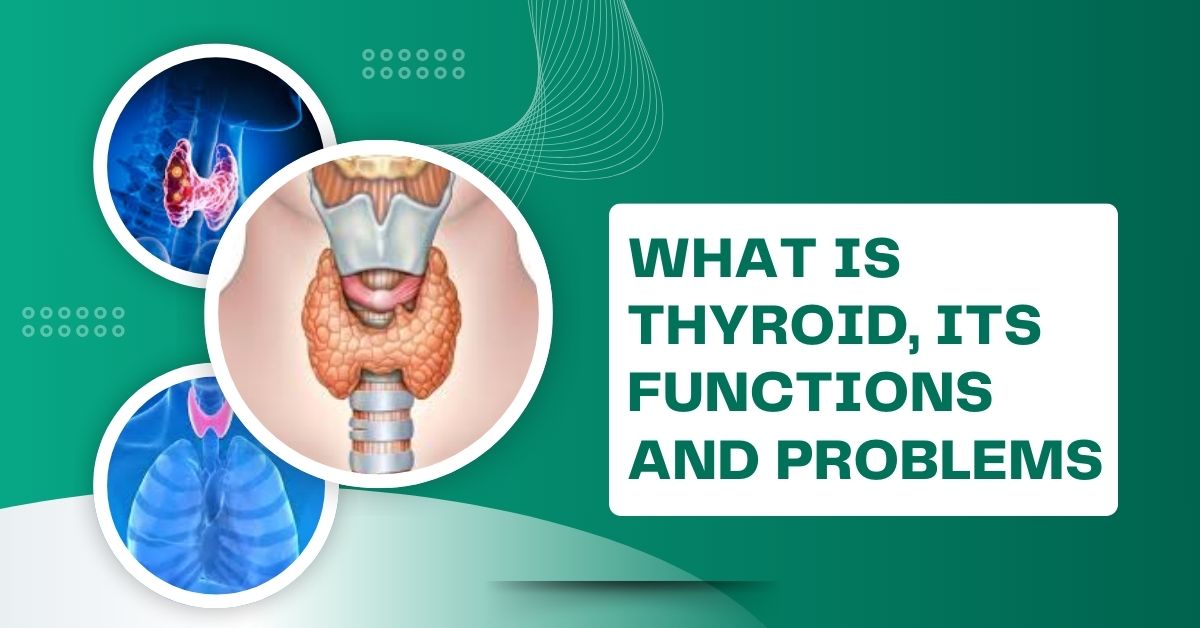What is Thyroid, its Functions and Problems are thyroid is one of the most important glands of human body, it controls body metabolism by releasing certain hormones. Due to various reasons, some times Thyroid doesn’t work properly. Following are the common conditions and disorders
The thyroid gland is a small but vital part of your endocrine system, playing a crucial role in maintaining your body’s overall health and functioning. In this comprehensive guide, we’ll explore the thyroid’s functions, common disorders, and the latest information on managing thyroid health.
Whether you’re seeking to understand the basics or looking for detailed insights into thyroid conditions, this post will provide valuable information and practical tips.
Understanding the Thyroid Gland
The thyroid gland is located in the front of your neck, just below the Adam’s apple. Shaped like a butterfly, it consists of two lobes connected by a thin strip of tissue called the isthmus. Despite its small size, the thyroid gland has a significant impact on many aspects of your health due to its role in hormone production.
What is Thyroid, its Functions and Problems
Functions of the Thyroid Gland
The thyroid gland’s primary function is to regulate metabolism through the production of thyroid hormones. These hormones influence virtually every cell in your body, affecting processes such as energy production, temperature regulation, and growth. Here’s a closer look at the main thyroid hormones and their functions:
1. Thyroxine (T4)
Thyroxine, commonly known as T4, is one of the two major hormones produced by the thyroid gland. It is synthesized in the thyroid follicles and released into the bloodstream. T4 is a precursor hormone that is converted into the more active form, Triiodothyronine (T3), in various tissues throughout the body. T4 is crucial for regulating the body’s metabolism, including the rate at which calories are burned and how energy is utilized.
2. Triiodothyronine (T3)
Triiodothyronine, or T3, is the more active thyroid hormone. It is derived from T4 through a process called deiodination. T3 has a potent effect on the body’s metabolism, affecting heart rate, body temperature, and overall energy levels. It is essential for normal growth and development, and it plays a critical role in regulating the body’s metabolic processes.
3. Calcitonin
Calcitonin is another hormone produced by the thyroid gland, albeit in smaller amounts compared to T3 and T4. Its primary role is to regulate calcium levels in the blood. Calcitonin lowers blood calcium levels by inhibiting bone resorption and increasing calcium excretion through the kidneys.
Common Thyroid Disorders
Despite its essential functions, the thyroid gland is susceptible to various disorders. These conditions can disrupt the balance of thyroid hormones and lead to a range of health issues. Here, we cover some of the most common thyroid disorders, their symptoms, causes, and treatments.
1. Hypothyroidism
Hypothyroidism is a condition in which the thyroid gland is underactive and fails to produce enough thyroid hormones. This leads to a slower metabolism and can result in various symptoms, including:
- Fatigue: Persistent tiredness and low energy levels.
- Weight Gain: Unexplained weight gain despite a normal diet and exercise.
- Cold Intolerance: Sensitivity to cold temperatures.
- Dry Skin and Hair: Skin may become dry and hair brittle.
- Constipation: Slowed digestive function.
Causes: Hypothyroidism can be caused by autoimmune diseases (such as Hashimoto’s thyroiditis), certain medications, radiation therapy, or iodine deficiency.
Diagnosis and Treatment: Diagnosis is typically made through blood tests measuring levels of thyroid-stimulating hormone (TSH) and thyroid hormones (T3 and T4). Treatment usually involves daily use of synthetic thyroid hormone levothyroxine to normalize hormone levels.
2. Hyperthyroidism
Hyperthyroidism is characterized by an overactive thyroid gland that produces excessive amounts of thyroid hormones. This results in a faster metabolism and can cause symptoms such as:
- Weight Loss: Significant weight loss despite an increased appetite.
- Rapid Heartbeat: Palpitations and an accelerated heart rate.
- Heat Intolerance: Increased sensitivity to heat.
- Tremors: Shaking or trembling of the hands and fingers.
- Anxiety: Increased nervousness and irritability.
Causes: Common causes of hyperthyroidism include Graves’ disease (an autoimmune condition), thyroid nodules, and excessive iodine intake.
Diagnosis and Treatment: Hyperthyroidism is diagnosed through blood tests showing elevated levels of T3 and T4 and suppressed TSH levels. Treatments may include antithyroid medications, radioactive iodine therapy, or surgery to remove part of the thyroid gland.
3. Thyroid Nodules
Thyroid nodules are lumps that can develop within the thyroid gland. While most thyroid nodules are benign and asymptomatic, some can be cancerous or cause symptoms like difficulty swallowing or breathing.

Causes: Thyroid nodules can arise due to various factors including iodine deficiency, inflammation, or genetic predisposition.
Diagnosis and Treatment: Thyroid nodules are usually diagnosed through ultrasound imaging and fine needle aspiration (FNA) biopsy if needed. Treatment depends on the nature of the nodule, ranging from monitoring and regular check-ups to surgical removal if the nodule is cancerous.
4. Hashimoto’s Thyroiditis
Hashimoto’s thyroiditis is an autoimmune disorder where the immune system attacks the thyroid gland, leading to chronic inflammation and often resulting in hypothyroidism.
Symptoms: Symptoms of Hashimoto’s thyroiditis include fatigue, weight gain, cold intolerance, and depression.
Diagnosis and Treatment: Diagnosis is made through blood tests detecting elevated levels of antibodies against thyroid tissues. Treatment generally involves hormone replacement therapy to manage hypothyroidism.
5. Thyroiditis
Thyroiditis is an inflammation of the thyroid gland that can be caused by infections, autoimmune diseases, or other factors.
Symptoms: Symptoms of thyroiditis can include pain in the thyroid region, swelling, fever, and changes in thyroid hormone levels.
Diagnosis and Treatment: Diagnosis typically involves blood tests, imaging studies, and sometimes biopsy. Treatment varies based on the cause and may include medications to reduce inflammation, antibiotics for infections, or hormone therapy if thyroid function is affected.
Managing Thyroid Health
Maintaining thyroid health involves regular check-ups and being mindful of any changes in your health. Here are some tips for managing thyroid health effectively:
1. Regular Monitoring
If you have a known thyroid disorder or are at risk, regular monitoring through blood tests is crucial. This helps track hormone levels and adjust treatment as needed.
2. Healthy Diet
A balanced diet can support thyroid health. Include foods rich in iodine, selenium, and zinc, which are essential for thyroid function. Foods like fish, dairy products, nuts, and seeds can be beneficial.
3. Medications as Prescribed
If you’re on thyroid medication, take it exactly as prescribed by your healthcare provider. Do not alter the dosage without consulting your doctor, as this can affect your thyroid function.
4. Lifestyle Adjustments
Stress management, regular exercise, and adequate sleep are important for overall health and can positively impact thyroid function.
Conclusion
The thyroid gland, though small, plays a significant role in regulating many of your body’s critical functions. Understanding its functions and common disorders can help you manage your health effectively and seek appropriate treatment if needed. Regular check-ups, a balanced diet, and a healthy lifestyle are key components of maintaining thyroid health.
If you experience symptoms like unexplained weight changes, fatigue, or mood swings, it’s essential to consult with a healthcare provider to assess your thyroid health. Staying informed and proactive about thyroid health can lead to better overall well-being and a higher quality of life.
Feel free to share this guide with friends and family who might benefit from understanding more about the thyroid gland and its impact on health. For more articles and updates on health and wellness, subscribe to our blog!

